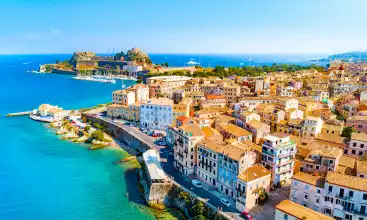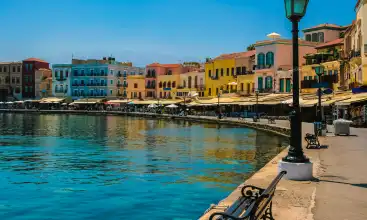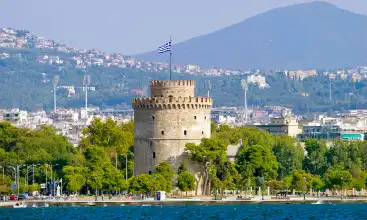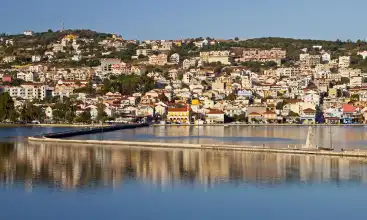- Over 1 million successful rentals

Car Hire Greece
Save time and money. We compare the offers of car rental companies in Greece on your behalf.
- Free cancellation Up to 48 hours prior to the scheduled pick up time
- Best price guarantee Have you found a better price? Let us know and we will make you a better offer.
- 24000+ pick-up locations Locations around the world

Compare Car Hire
Carrentals.co.uk offers simple and straightforward car hire comparison services. We don't add a penny to your quotes!
Car rental offers in Greece
Whether you're looking for a small rental car or a station wagon for the entire family, we will always have a suitable vehicle for the lowest price. Below are some examples from our selection in Greece.

-
Abbycar From£ 2 /day -
wheego From£ 3 /day -
Drive Hellas From£ 4 /day

-
Abbycar From£ 2 /day -
Carwiz rent a car From£ 3 /day -
Record Go From£ 3 /day

-
SurPrice car rentals From£ 4 /day -
Volta4u From£ 6 /day -
Green Motion From£ 6 /day

-
SurPrice car rentals From£ 3 /day -
Carwiz rent a car From£ 3 /day -
Goldcar From£ 5 /day

-
SurPrice car rentals From£ 3 /day -
Volta4u From£ 3 /day -
Record Go From£ 3 /day

-
SurPrice car rentals From£ 5 /day -
Carwiz rent a car From£ 10 /day -
Autounion Car Rental From£ 11 /day

-
Right Cars From£ 3 /day -
Carwiz rent a car From£ 3 /day -
Exer Rent A Car From£ 5 /day

-
Right Cars From£ 3 /day

-
Green Motion From£ 5 /day -
Sixt From£ 15 /day

-
Abbycar From£ 3 /day -
Right Cars From£ 3 /day -
Carwiz rent a car From£ 4 /day

-
SurPrice car rentals From£ 3 /day -
Abbycar From£ 3 /day -
Carwiz rent a car From£ 4 /day

-
SurPrice car rentals From£ 5 /day -
Green Motion From£ 5 /day -
Carwiz rent a car From£ 9 /day

-
Abbycar From£ 3 /day -
Volta4u From£ 4 /day -
Record Go From£ 4 /day

-
Abbycar From£ 3 /day -
Right Cars From£ 3 /day -
Carwiz rent a car From£ 4 /day

-
Volta4u From£ 6 /day -
Exer Rent A Car From£ 7 /day -
SKG Rent A Car From£ 7 /day

-
Right Cars From£ 3 /day -
Volta4u From£ 4 /day -
SurPrice car rentals From£ 5 /day

-
Carwiz rent a car From£ 4 /day -
Alamo From£ 11 /day -
Enterprise From£ 12 /day

-
Yours Carrental From£ 6 /day

-
SurPrice car rentals From£ 3 /day -
SKG Rent A Car From£ 6 /day

-
Carwiz rent a car From£ 4 /day -
Abbycar From£ 5 /day -
Record Go From£ 5 /day

-
SurPrice car rentals From£ 6 /day -
SKG Rent A Car From£ 9 /day

-
SurPrice car rentals From£ 4 /day -
OK Mobility From£ 7 /day

-
SurPrice car rentals From£ 4 /day -
Carwiz rent a car From£ 4 /day -
Centauro From£ 5 /day

-
SurPrice car rentals From£ 6 /day

-
Carwiz rent a car From£ 4 /day -
Yours Carrental From£ 7 /day

-
SurPrice car rentals From£ 5 /day

-
Exer Rent A Car From£ 7 /day

-
SurPrice car rentals From£ 5 /day -
Carwiz rent a car From£ 7 /day -
Caldera From£ 10 /day

-
SurPrice car rentals From£ 5 /day -
Carwiz rent a car From£ 27 /day

-
SurPrice car rentals From£ 6 /day -
Caldera From£ 15 /day -
Carwiz rent a car From£ 15 /day

-
SurPrice car rentals From£ 5 /day -
Carwiz rent a car From£ 5 /day -
Green Motion From£ 6 /day

-
Abbycar From£ 5 /day -
Green Motion From£ 6 /day -
Right Cars From£ 8 /day

-
SKG Rent A Car From£ 9 /day -
SurPrice car rentals From£ 12 /day

-
Carwiz rent a car From£ 6 /day

-
SurPrice car rentals From£ 6 /day

-
Yours Carrental From£ 9 /day -
Exer Rent A Car From£ 9 /day -
Carwiz rent a car From£ 11 /day

-
SurPrice car rentals From£ 7 /day

-
SurPrice car rentals From£ 8 /day

-
SurPrice car rentals From£ 8 /day -
Royal Rent a Car Crete From£ 22 /day

-
SurPrice car rentals From£ 10 /day -
Royal Rent a Car Crete From£ 24 /day

-
Carwiz rent a car From£ 10 /day

-
Carwiz rent a car From£ 10 /day

-
SKG Rent A Car From£ 11 /day

-
SKG Rent A Car From£ 10 /day

-
SKG Rent A Car From£ 10 /day

-
Abbycar From£ 16 /day

-
SurPrice car rentals From£ 19 /day

-
Yours Carrental From£ 22 /day

-
Exer Rent A Car From£ 20 /day -
SurPrice car rentals From£ 21 /day -
Green Motion From£ 23 /day

-
Carwiz rent a car From£ 24 /day

-
Yours Carrental From£ 22 /day

-
Green Motion From£ 23 /day

-
Enterprise From£ 26 /day

-
Carwiz rent a car From£ 23 /day -
Europcar From£ 31 /day

-
SKG Rent A Car From£ 13 /day

-
SKG Rent A Car From£ 15 /day

-
SKG Rent A Car From£ 16 /day

-
SurPrice car rentals From£ 17 /day

-
SurPrice car rentals From£ 18 /day

-
Volta4u From£ 18 /day -
National Car Rental From£ 33 /day

-
SKG Rent A Car From£ 22 /day

-
Carwiz rent a car From£ 22 /day -
Budget From£ 29 /day -
Drive On Holidays From£ 42 /day

-
Avis From£ 28 /day

-
Carwiz rent a car From£ 10 /day -
SurPrice car rentals From£ 12 /day

-
SurPrice car rentals From£ 11 /day

-
SKG Rent A Car From£ 15 /day

-
Abbycar From£ 12 /day -
Caldera From£ 15 /day -
Volta4u From£ 15 /day

-
SKG Rent A Car From£ 12 /day -
Cargini From£ 36 /day

-
Yours Carrental From£ 17 /day -
Autounion Car Rental From£ 19 /day -
wheego From£ 52 /day

-
Yours Carrental From£ 16 /day -
Autounion Car Rental From£ 17 /day -
wheego From£ 47 /day

-
SKG Rent A Car From£ 18 /day

-
SKG Rent A Car From£ 16 /day

-
SurPrice car rentals From£ 19 /day -
Abbycar From£ 21 /day -
Volta4u From£ 27 /day

-
Exer Rent A Car From£ 20 /day -
SurPrice car rentals From£ 21 /day -
Volta4u From£ 23 /day

-
Exer Rent A Car From£ 28 /day -
Autounion Car Rental From£ 30 /day -
Green Motion From£ 32 /day

-
SurPrice car rentals From£ 22 /day -
addCarRental From£ 29 /day -
SK Rent From£ 47 /day

-
SurPrice car rentals From£ 23 /day -
Green Motion From£ 24 /day -
Volta4u From£ 27 /day

-
Carwiz rent a car From£ 29 /day -
Autounion Car Rental From£ 31 /day -
Exer Rent A Car From£ 32 /day

-
Goldcar From£ 24 /day -
Green Motion From£ 27 /day -
Autounion Car Rental From£ 36 /day

-
Exer Rent A Car From£ 25 /day -
Green Motion From£ 26 /day -
Abbycar From£ 26 /day

-
Exer Rent A Car From£ 32 /day -
Enterprise From£ 45 /day -
Caldera From£ 49 /day

-
OK Mobility From£ 4 /day -
Goldcar From£ 7 /day -
Record Go From£ 8 /day

-
Yours Carrental From£ 14 /day -
Record Go From£ 15 /day -
Europcar From£ 15 /day

-
Green Motion From£ 15 /day

-
Autounion Car Rental From£ 18 /day

-
Autounion Car Rental From£ 22 /day

-
SurPrice car rentals From£ 20 /day

-
Volta4u From£ 20 /day -
Royal Rent a Car Crete From£ 47 /day

-
SurPrice car rentals From£ 25 /day

-
wheego From£ 21 /day -
Record Go From£ 24 /day -
Sixt From£ 24 /day

-
Record Go From£ 5 /day -
SurPrice car rentals From£ 6 /day -
Volta4u From£ 7 /day

-
Record Go From£ 5 /day -
Drive Hellas From£ 7 /day -
Goldcar From£ 7 /day

-
SKG Rent A Car From£ 9 /day -
Sixt From£ 20 /day -
Thrifty From£ 22 /day

-
SurPrice car rentals From£ 5 /day -
OK Mobility From£ 7 /day -
Centauro From£ 11 /day

-
Centauro From£ 6 /day -
Carwiz rent a car From£ 8 /day -
Thrifty From£ 15 /day

-
SKG Rent A Car From£ 10 /day -
Enterprise From£ 17 /day -
Alamo From£ 21 /day

-
Carwiz rent a car From£ 6 /day

-
Exer Rent A Car From£ 6 /day -
SKG Rent A Car From£ 13 /day

-
Yours Carrental From£ 11 /day -
Carwiz rent a car From£ 17 /day -
Exer Rent A Car From£ 17 /day

-
Europcar From£ 11 /day

-
Europcar From£ 11 /day -
Sixt From£ 13 /day -
Avis From£ 16 /day

-
Europcar From£ 12 /day

-
Europcar From£ 16 /day -
Sixt From£ 19 /day -
Avis From£ 20 /day

-
Avis From£ 17 /day

-
Enterprise From£ 19 /day -
Alamo From£ 47 /day

-
Avis From£ 21 /day

-
Avis From£ 19 /day -
wheego From£ 121 /day

-
Hertz From£ 20 /day
Popular cities in Greece







Popular rental locations in Greece
-
Car Hire Athens AirportFrom
£ 2 /day -
Car Hire Corfu AirportFrom
£ 4 /day -
Car Hire Heraklion AirportFrom
£ 2 /day -
Car Hire Thessaloniki AirportFrom
£ 2 /day -
Car Hire Rhodes AirportFrom
£ 5 /day -
Car Hire Kefalonia AirportFrom
£ 4 /day -
Car Hire Zakynthos AirportFrom
£ 3 /day -
Car Hire Kalamata AirportFrom
£ 6 /day

When to book a rental car in Greece
Greece - When is the most affordable time to rent a mini class car?
At this destination (Greece), February is the most affordable time to rent a mini class car with an average daily rate of
Greece - When is the most affordable time to rent a economy class car?
At this destination (Greece), February is the most affordable time to rent a economy class car with an average daily rate of
Greece - When is the most affordable time to rent a compact class car?
At this destination (Greece), February is the most affordable time to rent a compact class car with an average daily rate of
Greece - When is the most affordable time to rent an intermediate class car?
At this destination (Greece), January is the most affordable time to rent a intermediate class car with an average daily rate of
Greece - When is the most affordable time to rent a standard class car?
At this destination (Greece), January is the most affordable time to rent a standard class car with an average daily rate of
Greece - When is the most affordable time to rent a full-size car?
At this destination (Greece), February is the most affordable time to rent a full-size class car with an average daily rate of
Greece - When is the most affordable time to rent a luxury car?
At this destination (Greece), October is the most affordable time to rent a luxury class car with an average daily rate of
Greece - When is the most affordable time to rent a station wagon?
At this destination (Greece), January is the most affordable time to rent a station wagon with an average daily rate of
Greece - When is the most affordable time to rent a SUV?
At this destination (Greece), March is the most affordable time to rent an SUV with an average daily rate of
Greece - When is the most affordable time to rent a MPV?
At this destination (Greece), February is the most affordable time to rent an mpv with an average daily rate of
Greece - When is the most affordable time to rent a minivan?
At this destination (Greece), February is the most affordable time to rent a minibus with an average daily rate of
Greece - When is the most affordable time to rent a sports car?
At this destination (Greece), October is the most affordable time to rent a sports car with an average daily rate of
Greece - When is the most affordable time to rent a convertible?
At this destination (Greece), February is the most affordable time to rent a convertible with an average daily rate of
Greece - When is the most affordable time to rent a delivery van?
At this destination (Greece), March is the most affordable time to rent a van with an average daily rate of
Car rental locations in Greece
Carrentals.co.uk compares rental car prices at the following destinations

Greece Guide
Greece is best explored by rental car. Carrentals.co.uk has over 173 pick-up locations in Greece. This means there is always a pick-up location close to your destination.
Most popular car hire locations in Greece
Driving
Greece is among the most popular travel destinations in Europe, boasting everything from ancient history to vibrant cities and natural beauty. By car, holidaymakers can explore Athens and beyond before driving through idyllic Mediterranean countryside as they make their way to the islands.
Driving Tips for Greece
Grecian roads between major cities are well developed. In the countryside and on the islands though, roads are notoriously pot-holed and mountainous, meaning caution should be exerted. In these areas, signage can be scarce.
Driving licences: a UK licence plus an International Driving Permit are required.
Which side does Greece drive on: the right.
Speed limits:
Dual carriageways and highways (outside urban areas): 75mph (120kph)
National or provincial roads: 68mph (110kph)
Local roads: 50mph (80kph)
Urban roads: 31mph (50kph)
Alcohol limits: 0.05 per cent compared to the British limit of 0.08 per cent. Offenders run the risk of encountering steep fines and even prison time. Police regularly establish checkpoints around tourist areas.
Driving age: 18 years; 21 years to rent a car.
Seatbelts: must be worn by every passenger in the vehicle. Children under the age of 10 are required to ride in the back, while babies must sit in a fitted child safety seat in the back of the vehicle.
Mobile phones and GPS: driving while making use of a mobile phone is strictly prohibited and offenders may be hit with hefty fines. GPS can be useful for navigating the countryside.
Cost of fuel in Greece: roughly the same as in Britain.
Car hire and fuel payment: those wishing to rent a vehicle in Greece must present a valid credit card as cash deposits are rarely allowed. Although Greek cities have petrol stations where credit cards are commonly used to pay for fuel, paying by cash is often the only option in rural towns.
Insurance: car hire includes mandatory liability insurance; however, drivers won't be covered for collisions or incidental damage. For this reason, tourists are advised to carefully read the fine print of their contracts and arrange extra cover if needed.
Traffic and parking: Greek driving conditions are renowned for being challenging, especially in big cities such as Athens. Even in small towns, strict parking laws are in place and vehicles shouldn't be parked against the flow of traffic. A white 'P' on a blue sign means that parking is allowed.
Transport
Trains
All international rail travel has been suspended since February 2011. OSE supplies domestic trains but the network is limited as it is under major renovations that have been hampered by the country's current economic woes.
Taxis
There is an abundance of taxis in Greece but they can be hard to obtain if the driver isn't particularly interested in venturing to the side of town you are headed - especially in Athens. Typical fares run at around £0.50 per kilometre in most destinations, although islands may have taxis without meters.
Buses
International buses are limited but it is possible to catch a bus from neighbouring countries such as Bulgaria, Macedonia, Serbia, Georgia and Turkey. Intercity buses are supplied by KTEL, which offers both long and short travel options between major cities and even some of the islands, such as Corfu, that are close to the mainland. The typical cost of a bus from one mainland city to another is roughly £15.
Ferries
Those that like to travel on the seas are spoilt for choice whether venturing to Greece or around it. Internationally, ferries are possible from Venice, Trieste and Bari (Italy), Mamaris, Cesme and Kusadasi (Turkey), Alexandria (Egypt) and Haifa (Israel), among other places. Domestically, most of the islands are connected to the mainland or one another. Companies such as Agoudimos Lines, Blue Star Ferries, Euroseas, Aegean Speed Lines, Hellenic Seaways, ANEK Lines and Superfast Ferries provide both domestic and international sea travel.
Airports
Athens' Eleftherios Venizelos International Airport handles in excess of 15 million passengers every year and is among Europe's most connected hubs. The likes of Aegean Airlines and Olympic Air supply international flights to and from Greece and around the mainland and islands. Budget carriers such as EasyJet connect the country to UK airports such as London-Gatwick, London-Luton and Manchester, with return fares sometimes as low as £50 if booked several months in advance. British nationals aren't required to arrange a visa prior to travelling to Greece.
Explore
Exploring Greece
Although it might not be every tourist's first port of call due to the popularity of the islands, Athens is where the majority of tourists begin their time in the country. The capital city is most famous for its Acropolis, which is considered to be modern Western civilisation’s birthplace and is a UNESCO World Heritage site. The Ancient Agora and numerous other historical landmarks stand nearby, while the city is regularly praised for its nightlife and cuisine.
The southern-situated island of Crete is among Europe's most popular holiday destinations. While there are plenty of resorts here, many visitors establish a base in Heraklion, perhaps best known for Knossos archaeological site, or Chania for its plethora of beaches.
Thessaloniki, unmistakeable for its White Tower, boasts a 3,000-year history and has managed to masterfully preserve monuments that the Romans, Byzantines and Ottoman-Turks left behind. The churches here are noted for being some of Greece's finest UNESCO World Heritage sites.
Challenging Crete for the accolade of Greece's most popular island is Corfu, which is a popular choice with British holidaymakers. Although the majority of visitors come to enjoy the beaches, idyllic villages such as Nympnes and Kynopiastes, Achilleion palace and various historic buildings are also worth the effort.
Our Travel Editor’s Recommended Drives
Nestos Valley Drive – along the border with Macedonia lies a wild frontier where tobacco farms adorn valleys situated between small idyllic villages.
Amari Valley – among Crete’s most lush areas is a setting that typifies the Mediterranean experience. Expect to see olive groves, charming villages, vineyards and fruit orchards. This drive is the best way to a get a true insight into Cretan life.
Ioannina to Meteora – unique rock formations sit among soft, mountainous landscape. This is where the majority of Greece’s most famous monasteries are situated.
Kastoria to the Prespa Lakes – this northeastern route boasts an endless array of natural scenery and wildlife. Roads pass around and through the national park surrounding the Prespa Lakes and tiny villages in the mountains.
Holidays and Festivals
New Year's Day (1 January)
Epiphany (6 January)
Independence Day (25 March)
Good Friday (March/April)
Assumption Day (15 August)
Epidaurus Festival (September)
Christmas Day (25 December)
Weather
Most of Greece experiences a Mediterranean climate that is both warm and dry; however, the northern regions are cold in winter. Greek summers are hot and dry but conditions vary from place to place. While Athens might be hot and humid, the islands and coastal destinations are much cooler due to their brisk sea breezes. The majority of rain drops between November and March, which is known as being the coolest period of the year. The best time to visit is generally considered to be between July and August, when temperatures regularly exceed 30°C.
Practical Stuff
Greece Travel Tips
Greece is among the most favoured travel destinations for Brits, and with good reason. It boasts a comfortable mix of ancient landmarks and paradise-like islands that guarantee something to excite every itinerary.
Greece contact numbers
Country code - (+30)
Emergency Medical – 166
Emergency Police – 100
Emergency Fire – 199
Emergency services – 112
British Embassy – +30 210 727 2600
British Consular Emergency Services – +30 210 727 2600
US Embassy – +30 210 721 2951
Canadian Embassy – +30 210 727 3400
Irish Embassy – +30 210 723 2771
Australian Embassy – +30 210 870 4000
Money matters
Greece uses the euro. Travellers’ cheques are widely accepted by most businesses or can be changed at banks. ATMs are easy to find and accept Visa, Cirrus, Maestro and MasterCard.
Health and safety
Travellers to Greece are advised to get vaccinated against hepatitis A and B before they leave the UK. EU and Swiss citizens are entitled to free emergency healthcare as long as they produce their passport or European Health Insurance Card. Tap water may be consumed in Athens but not on the islands or in rural destinations.
Fitting in…
Greeks are known for their warm hospitality and hosting guests is a national pastime. Those attending a party or any kind of function are expected to fill their stomachs and drink and dance until they drop.
Visas for Greece
EU citizens are required to show their passports or national ID cards to enter the country. British citizens may stay in Greece for an indefinite stay. Nationals of America, Canada or Australia are allowed to stay for up to three months. Other nationals are advised to contact their nearest Greek embassy for visa requirements.
Electricity
British and American citizens should bring travel adaptors with them as the two round pinned plugs used in most of Europe are also found here.
Business hours
Businesses: 08:30 to 17:30, Monday to Friday
Shops: 09:00 to 14:30, Monday, Wednesday, Saturday, 09:00 to 14:30 and 17:30 to 20:30, Tuesday, Thursday and Friday
Banks: 08:30 to 14:30, Monday to Thursday, 08:00 to 14:00, Friday.
Helpful phrases
Yia sou - Hello
Efharisto – Thank-you
Parakalo - Please
Ne/ohi – Yes/no
Ti kanis? – How are you?
Practical information
-
CurrencyEuro
-
Driving directionRight
-
City speed limit50 km/h
-
Freeway speed limit90 km/h
-
LanguageGreek (modern)
-
Popular car categoryEconomy
What most people want to know
The following questions and answers are a selection of the most popular questions. If you do not find the answer to your question, have a look at the Frequently Asked Questions page or contact us.
- CarQ
- Enterprise
- National Car Rental
- Autounion Car Rental
- Avis
- Budget
- Alamo
- Europcar
- Yours Carrental
- Sixt
- SKG Rent A Car
- Drive Hellas
- Thrifty
- Dollar Rent a Car
- Flizzr
- Exer Rent A Car
- Goldcar
- Keddy By Europcar
- Payless Car Rental
- Record Go
- Street Rent a Car
- SurPrice car rentals
- Carwiz rent a car
- Volta4u
- GLOBAL Rent-a-Car
- Green Motion
- Caldera
- Zezgo
- Royal Rent a Car Crete
- OK Mobility
- wheego
- addCarRental
- FireFly Car Rental
- United rent a car
- InterRent
- Abbycar
- Global Rent a Car
- Centauro
- SK Rent
- Right Cars
- LETS DRIVE
- Routes
- Hertz
- OtoQ
- Cargini
- Alpha Car Hire
- Value Car Rentals
- Rent Max
- Autorents.gr
- Autorent Santorini
- DRIVUS
- Mex Rent a Car
- Your Rent
- DiRENT a car
- City Car Rent a Car
- Viaggiare Rent
- Autoclick
- Tourent
- NÜ Car Rentals
- Acropolis Rent a Car
- Goldcar Key'n Go
- Hawk Rent A Car